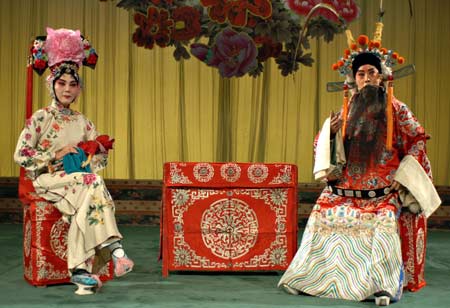New Peking Opera adds kabuki, ballet
Updated: 2007-11-28 22:19
Everyone talks about revitalizing Peking Opera, adding modern elements and attracting new young fans. A popular though controversial "New Peking Opera" production downplays some traditional elements and introduces something that make purists frown: modern ballet, folk dance, Western opera and kabuki theater.
 |
|
Performers of the Ningxia Peking Opera Troupe take part in a rehearsal in Yinchuan, capital of Northwest China's Ningxia Hui Autonomous Region, on July 19, 2007. The Ningxia Peking Opera Troupe, which was founded in 1958, combines the traditional opera with acrobatics, singing and dancing to publicize and reinvigorate the Peking Opera. [Xinhua] |
Innovative Peking Opera artist Wu Rujun, returning from 20 years in Japan, will stage his production "The Love of the Cowherd and Weaver Girl" at Shanghai Yifu Theater on December 7 and 8.
To many Peking Opera fans, Wu is known for his versatility in playing the two-stringed "jinghu" fiddle, a traditional opera accompaniment, and playing impressive female roles.
He returns to Chinese opera after 20 years' innovating in music, performing Peking Opera, founding a company and spreading the word about Peking Opera in Japan.
The "Cowherd and Weaver Girl" is not known as a Peking Opera, so the production is a first not only bringing it to the Peking Opera stage but also in modifying traditional opera and incorporating other forms of theater.
The story of star-crossed lovers, the weaver daughter of the Emperor of Heaven and an orphaned mortal cowherd, is the origin of Chinese Valentine's Day. They are separated by the Emperor and only allowed to meet once a year on the day of "Qixi" - the seventh day of seventh lunar month - when they cross the Milky Way on a bridge of magpies' wings.
Wu will play the weaver girl. The cowherd will be played by veteran performer Wang Ping, who also is director of Tianjin Peking Opera House. The opera also features Kou Chunhua, known for his roles as "chou" (clown) characters.
The production, which debuted in Beijing in August, attracted some controversy for its dilution of the traditional art form, but it was very popular with audiences.
It attempts to connect Peking Opera with different theater genres, such as traditional Japanese kabuki theater and modern ballet.
Some stylistic and other elements in the facial makeup and tunes of traditional Peking Opera have been weakened to attract a wider audience. Folk dance, ballet and even Western opera are part of several dreamlike scenes.
"Though the show may have created a controversy, it was very popular in Beijing," says Zhou Youcheng, a Peking Opera expert and critic.
"Actually, what the audience needs is a developing and vibrant art form that suits today's market. Wu's efforts might be an inspiration for our traditional arts," he says.
Wu himself says his work is influenced by Japanese culture, as his wife is Japanese, and calls his production "New Peking Opera." His first six productions, including Peking Opera "Swan Lake," were welcomed by Japanese audiences. In 2000, he founded a Peking Opera troupe in Japan.
|
|
|
||
|
||
|
|
|
|